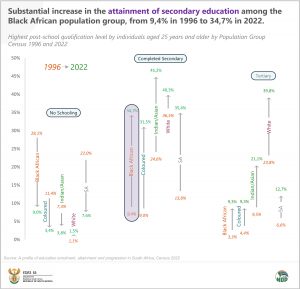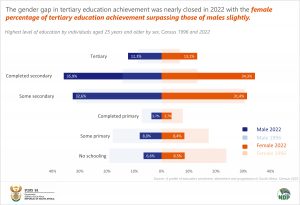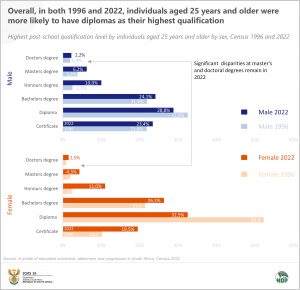Marginalised Communities in SA Achieve New Heights in Education
2024 commemorates three decades since the inception of democracy in South Africa. Since 1994, South Africa has ushered in notable reforms across multiple sectors, with education being one of the key areas of focus. These reforms aimed to address historical inequalities and improve access to quality education for all citizens. Substantial investments have been made in the education sector to support these goals.
One of the most notable achievements is the significant increase in enrolment rates across all levels of education. Enrolment rates have seen unprecedented growth, reflecting improved access to education for previously marginalised communities, resulting in higher educational achievements. This is according to a recently released report by Statistics South Africa titled Census 2022: A profile of education enrolment, attainment and progression in South Africa.
Educational advancements among the black African population in South Africa
According to the data, educational progress, particularly among the black African population in South Africa, is evident. There has been a notable decline in the percentage of individuals aged 25 years and older with only primary education or less. This percentage dropped from approximately 57,9% in 1996 to 22,2% in 2022. This decline underscores a considerable shift towards higher educational attainment levels among this group over the past three decades.
Furthermore, the data highlights a substantial increase in the attainment of secondary education among black Africans. Specifically, the percentage of individuals with secondary education more than tripled from 9,4% in 1996 to 34,7% in 2022. There was also a large increase in tertiary education attainment with the gaps between coloureds and black Africans having closed. This surge in secondary and tertiary education attainment signifies a positive trend towards greater access to and completion of higher levels of education within the black African population group.
Closing the gender gap in tertiary education attainment in South Africa
The data reveals a notable achievement in South Africa’s educational landscape, particularly concerning gender parity in tertiary education attainment. In 2022, the gender gap in tertiary education attainment was nearly closed, with the percentage of females surpassing that of males. Specifically, 13,1% of females attained tertiary qualifications, compared to 12,3% of males. This marks a significant advancement from 1996, when only 6,7% of females and 8,6% of males had obtained tertiary education.
The observed increase in tertiary education attainment among both genders indicates a positive trend towards greater access to and participation in higher education. The narrowing of the gender gap is particularly noteworthy as it signifies progress towards gender equality in educational opportunities and outcomes. Women’s increased representation in tertiary education reflects efforts to address historical disparities and promote inclusive educational policies.
Persistent gender disparities in senior qualification attainment
The data indicates that while there have been advancements in educational attainment overall, gender disparities persist, particularly at higher educational achievements such as master’s and doctoral degrees. Notably, in 1996, males comprised a larger proportion of bachelor’s degree holders compared to females. This pattern changed over time, with the percentage of female bachelor’s degree holders slightly surpassing that of males in 2022. In both years examined, there remains a notable gap between male and female attainment in
advanced degrees, with males consistently outnumbering females.
The data also highlights a significant rise in attaining honours degrees for both genders in 2022 compared to 1996. This increase suggests a growing focus on specialised education and skills enhancement among both male and female students. Honours degrees are indicative of advanced study and specialisation within a particular field, reflecting a commitment to academic excellence and professional development.
For more information, download the full report here.




